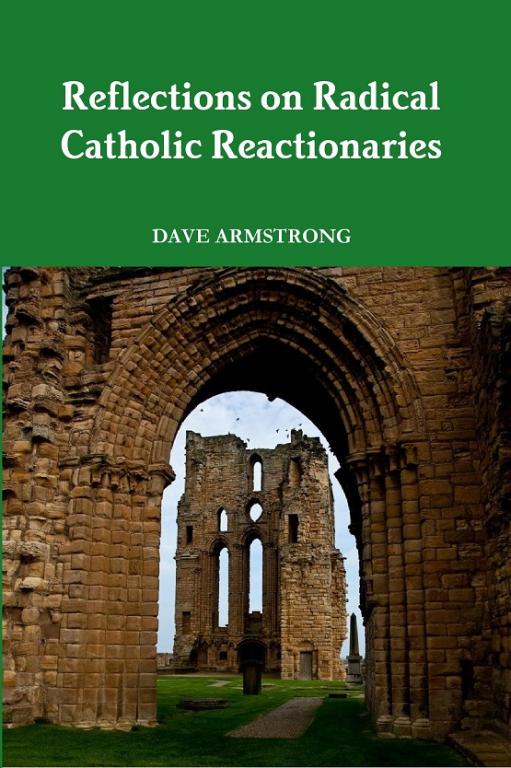
[chapter 7 of my book, Reflections on Radical Catholic Reactionaries]
***
130. There is a certain sort of Catholic convert from Protestantism who has been insufficiently converted from the outset. The “fundamentalist” mindset was received and nurtured from his Protestant days, and indicates a deep epistemological and theological / spiritual problem. Such a person has never really converted to a full-fledged Catholicism, with all that that entails in obedience and how one decides issues “Catholicly.” They haven’t accepted the Catholic faith in its entirety, in faith and submission, yielding up their private judgment: that is, a system of “authority” whereby the individual ultimately is the arbiter of truth over against a Christian institution or God-ordained Christian leaders. They have great difficulty believing that God uniquely guides the Catholic Church and protects Her from error by the Holy Spirit. I hasten to add that I am not claiming that such persons are not technically Catholics at all. I am saying, rather, that they haven’t properly learned how to think and believe like a Catholic (or have learned that but refuse to consistently abide by the Catholic understanding and outlook). They didn’t fully enter into the “Catholic mind.”
131. Fundamentalism in these “half-converts” is cultivated from within what they falsely think is the “orthodox” Catholic paradigmatic framework (and in Protestantism prior to that). The radical Catholic reactionary (“RCR”) who is also a convert generally wasn’t brought to fundamentalism as a Catholic; he already was a “fundamentalist” because that is a mental outlook and way of interpreting information and knowledge and factual data.
132. This “fundamentalist” mentality or mindset occupies some common “mental ground” between Catholics and Protestants because it is prior to theological reflection. It’s a shortcoming in one’s philosophical outlook and how those who disagree are regarded. Yet it is much more psychological than theological at bottom. Hence the ubiquitous paranoia, conspiratorialism, consignment of everyone to the left of them to “liberalism” or “Neo-Catholicism,” etc., etc. These types of individuals are sort of the modern-day Pharisees. The particular brand gets added to the pre-existing psychological mixture. These “half-converts” bring their “mix” to Catholicism.
133. Protestantism and fundamentalism are two different things, but with much overlap in practice (sociologically). Protestant ideas flow from the inherent principles of Protestantism (sola Scriptura, private judgment, sola fide, et al). The fundamentalist psychological mindset, on the other hand, is not inherent to Protestantism, but brought to it, and is logically or mentally prior to it (even though in practice it is characteristic of and largely confined to a large sub-group of the “conservative” Protestants). It is (ultimately or immediately) anti-intellectual and psychologically paranoid, with a huge fortress mentality (similar to right-wing wacko stuff or quack science or secular versions of conspiratorialism). The “fundamentalist mindset” in either Protestantism or Catholicism (but especially in the latter) is an aberration and a foreign element. It doesn’t logically or conceptually flow from the intrinsic principles of either system.
134. Fundamentalism (often leading to a wrongheaded RCRism) is much more typically characteristic (that is, it coincides or co-exists with), a certain sort of Protestant: derived historically from the fundamentalist-modernist controversies of the late 1800s up through the Scopes Trial in 1925 and beyond. “Half-converts” usually learn this type of outlook in a Protestant environment, as far as its precepts go. I think fundamentalism is at bottom a psychological malady and a failure of the intellectual imagination; a difficulty in understanding the criteria of plausibility, credibility, and in building or espousing intellectual systems; theological or otherwise. The hyper-dogmatism often observed in the insufficiently converted Catholic fundamentalist / RCR is a combination of both the private judgment principle and (seemingly) some sort of radical, profound psychological insecurity (characteristic of many anti-Catholics as well). To truly understand and convert to magisterial, orthodox Catholicism would be the end of such nonsense and over-reliance on and extreme overconfidence in one’s own opinions.
135. One is reminded of Communism and Naziism, in certain sociological respects. If you go too far left or right on the political spectrum, you come around full circle: it is a matter of extremes vs. the “center” (orthodoxy). The further right one goes ecclesiologically or in their formal principles of authority, the further left they also go. Liberals question the pope’s judgment and authority; so do Catholic Fundamentalist / RCRs. The liberals / modernists / so-called “progressives” want to de-sacralize the Mass by trivializing it, messing with the language and promoting mediocrity in liturgy, music, and architecture; the fundamentalist / RCRs want to butcher it by denying that the Novus Ordo Mass is valid or claiming that it is vastly inferior to the Tridentine Mass. One camp is nominalistic and spiritually bankrupt; the other is prideful, legalistic, and has lost faith in the guidance of Holy Mother Church by the Holy Spirit. The liberals are against sound reason and rationality (cf. Francis Schaeffer: Escape From Reason); so are the fundamentalist / RCRs. Both factions lack faith and spiritual vision. It all comes out basically the same in the wash. One is either orthodox or extreme, and the extremes tend to meet and have common ground, as a result of their fringe nature. Orthodoxy is like the center of the earth (or perhaps the equator). Liberalism and RCRism are akin to the north and south poles; they are a world apart geographically but there isn’t a whole lot of difference between them in terms of climate and landscape.
***
(originally 2-21-06)
***













